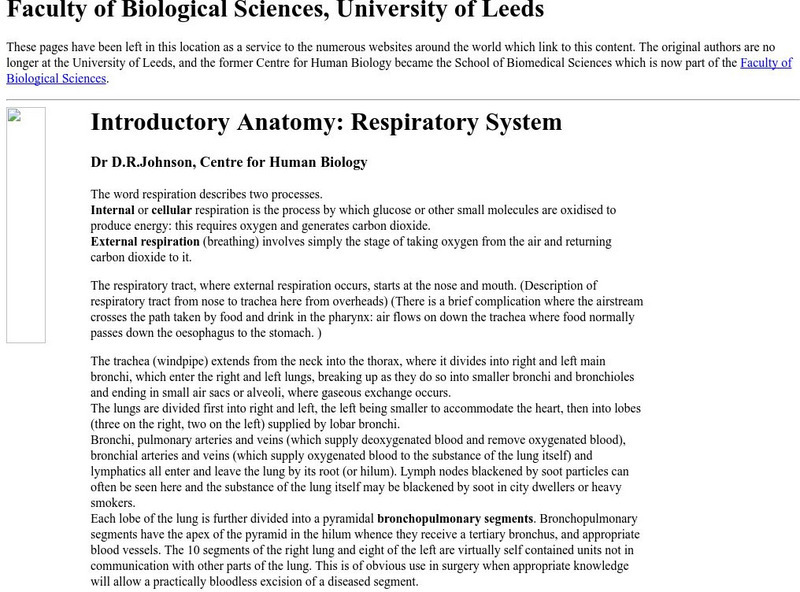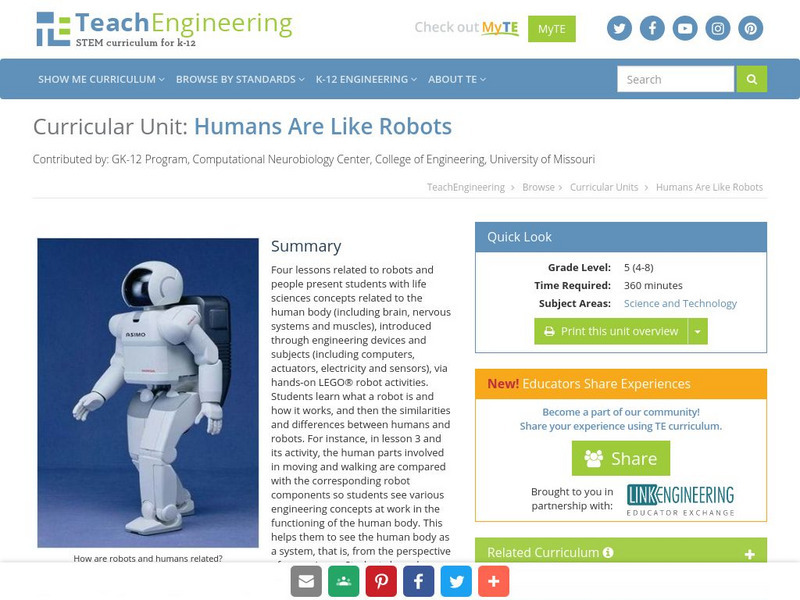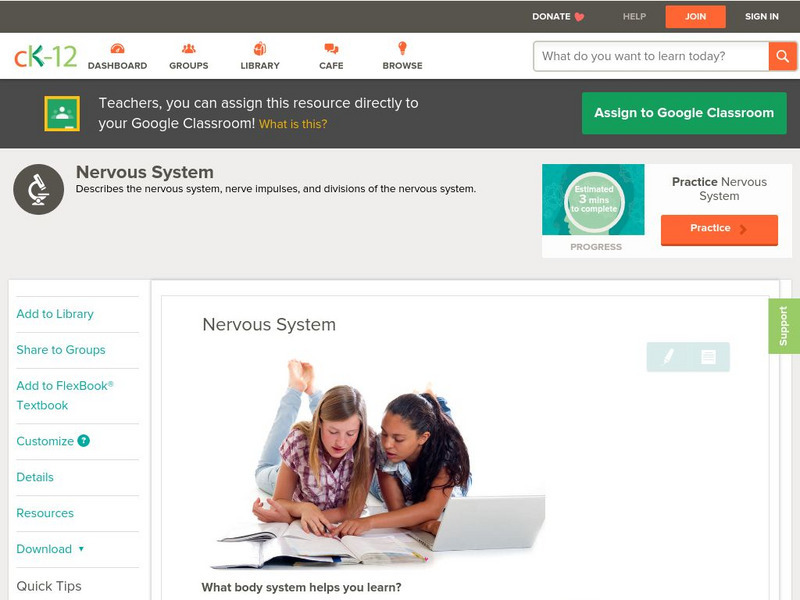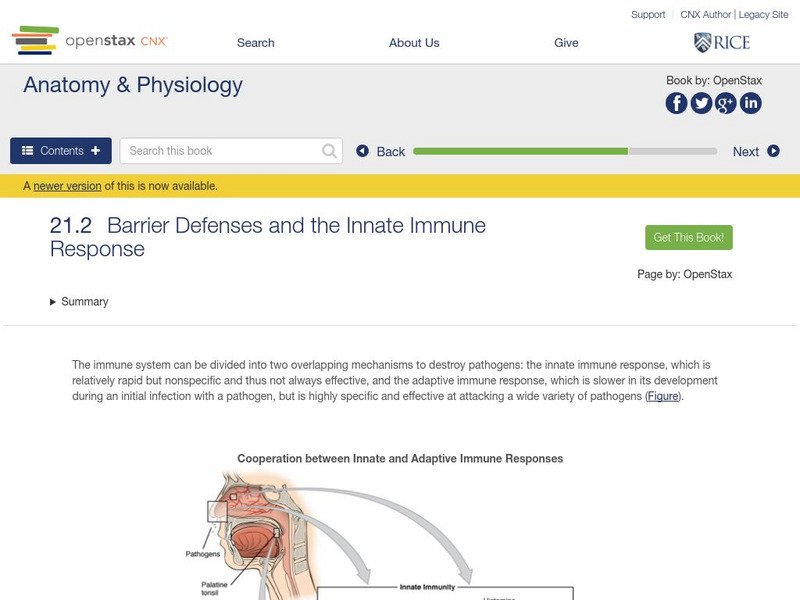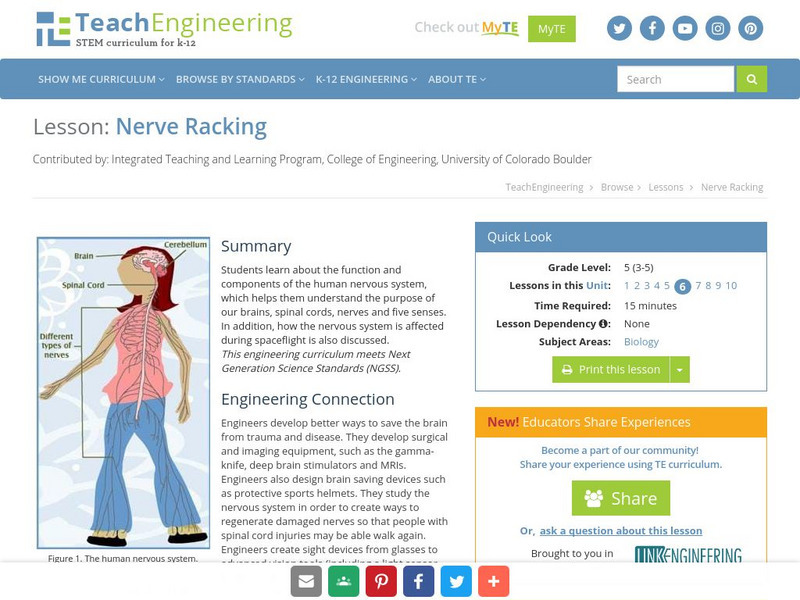Curated OER
Kids Health: How the Body Works: Your Nose
Learn about the nose and its function in the olfactory system of the human body. For auditory learners, a read-aloud feature is also available.
Other
Introductory Anatomy: Respiratory System
Here, you will find an introduction to the parts and functions of the respiratory system. In addition to learning about how the respiratory system works to keep you healthy, you will also read about problems that impede the breathing...
TeachEngineering
Teach Engineering: Humans Are Like Robots
Four lessons related to robots and people present students with life sciences concepts related to the human body (including brain, nervous systems and muscles), introduced through engineering devices and subjects (including computers,...
CK-12 Foundation
Ck 12: Life Science: Nervous System
[Free Registration/Login may be required to access all resource tools.] The nervous system, together with the endocrine system, controls all the other organ systems of the human body. Learn more about the nervous system in this learning...
Harvard University
Harvard University: Neurosurgical Service
This site from Harvard University offers a rating system of diagnosing Parkinson's Disease. It also presents the Unified Parkinson Disease Rating Scale (UPDRS) which measures mentation, behavior and mood, activities in daily life and...
TeachEngineering
Teach Engineering: Polluted Air = Polluted Lungs
To gain a better understanding of the roles and functions of components of the human respiratory system and our need for clean air, students construct model lungs that include a diaphragm and chest cavity. They see how air moving in and...
OpenStax
Open Stax: Anatomy & Physiology: Barrier Defenses and Innate Immune Response
Students use this module to learn about the barrier defenses and the immune defense functions of the human body.
Library of Congress
Loc: Everyday Mysteries: What Is the Strongest Muscle?
There are a variety of ways one can look at what might be the strongest muscle in the body. This site defines the various types of muscles and goes on to explain which would be considered the strongest.
ClassFlow
Class Flow: Life Processes
[Free Registration/Login Required] This flipchart can be used as a quiz or test covering cells, cell function, and organs of the body.
Alabama Learning Exchange
Alex: Bone Up!
In this lesson students will learn the basics about the skeletal system. They will be able to identify the major bones of the human body and explain the functions of the skeletal system. The students will have the opportunity to navigate...
TeachEngineering
Teach Engineering: Nerve Racking
This lesson describes the function and components of the human nervous system. It helps students understand the purpose of our brain, spinal cord, nerves and the five senses. How the nervous system is affected during spaceflight is also...
TeachEngineering
Teach Engineering: Fascinating Friction!
In this activity, students use wood, wax paper and oil to investigate the importance of lubrication between materials and to understand the concept of friction. Using wax paper and oil placed between pieces of wood, the function of...
American Cancer Society
American Cancer Society: Colorectal Cancer
After reading about the functions and jobs of a healthy colon and rectum, read about what happens when these parts of the human body become afflicted with cancer.
Other
Vitamin C Content of Fruit
This article talks about the vitamin C content in fruits. Learn how ripening and storage affect vitamin C, what the recommended daily allowance (RDA) for vitamin C is, and how vitamin C affects the human body.
Bartleby
Bartleby.com: The Fore Brain or Prosencephalon
This site from Bartleby.com contains an intense, in-depth article from Henry Gray's Anatomy of the Human Body on the fore-brain or prosencephalon. The article discusses the thalamus throughout and touches on its functions as a whole.
CK-12 Foundation
Ck 12: Life Science: 11.41 Nerve Impulse
Understand the structure and function of a nerve cell, and how messages are transmitted throughout the human body.
University of Utah
University of Utah: Cardiovascular Pathology Index
This site features a detailed index of photographs for cardiovascular pathology. You can see what a normal human heart looks like and what a sick one looks like too. Come and check it out.
CK-12 Foundation
Ck 12: Life Science: 11.8 Joints
Understand the structure and function of different types of joints in the human body.
PBS
Pbs Learning Media: Amazing Heart Facts
This feature from the NOVA: "Cut to the Heart" highlights facts about the heart, including its size and placement, and will help you to understand the importance of this wondrous organ in our bodies.
American Forum for Global Education
American Forum for Global Education: Parts of You
This site is provided for by the American Forum for Global Education. Exploration of body parts is the format used to teach the economic concept of interdependence to primary students.

